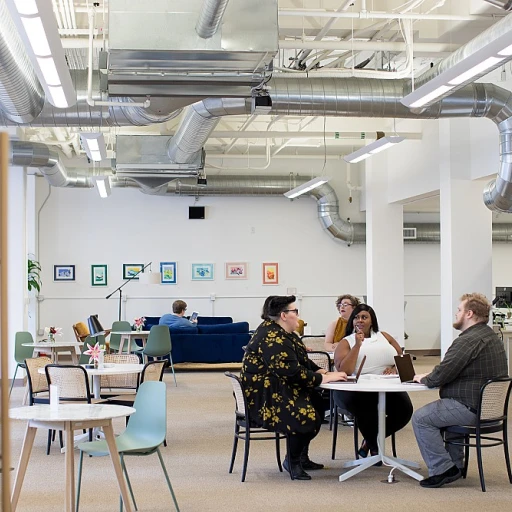
Understanding the Role of a People Operations Specialist
Grasping the Essentials of a People Operations Specialist's Role
The role of a People Operations Specialist embodies a unique blend of tasks that are crucial to the functioning of any organization. This position is often described within the broader context of human resources, yet it stands apart due to its specialized focus on cultivating a positive employee experience. In a fast-paced environment like New York City or San Francisco, where companies strive to stay competitive, the need for a proficient People Ops team is more essential than ever. A People Operations Specialist is tasked with managing, designing, and optimizing all aspects of the employee lifecycle. This includes recruiting, onboarding, and retaining talents while fostering a culture that champions employee satisfaction and productivity. The "people," as often referenced, become the central concern, making it vital for the Specialist to maintain a keen understanding of the company's workforce dynamics. One of the Specialist's main responsibilities is to identify and overcome the challenges in candidate experience. This aspect goes beyond job descriptions, extending into creating an atmosphere where potential hires feel valued and understood from their first interaction with the company. The ultimate aim is to blend operations with a human touch, ensuring a seamless and transparent recruitment process. To meet these needs, People Operations Specialists often employ data-driven strategies, facilitating operations through advanced analytics. They're responsible for gathering data to gauge the efficiency of recruitment processes and the general employee experience. Moreover, a proficient Operations Specialist will leverage relevant software tools to enhance recruitment efforts, thus reducing the workload of human resources teams and increasing the overall efficiency. The Specialist also ensures that the recruitment process aligns with the company's culture and values. Balancing remote work opportunities and providing comprehensive insurance benefits are just a few elements that reflect positively on a company's people culture. By designing efficient workflows and maintaining a focus on employee experience, the People Operations Specialist takes on a pivotal role in shaping a successful workplace environment. For those interested in delving deeper into the nuances of enhancing the hiring process, exploring ways to boost candidate engagement can provide valuable insights and practical strategies.Key Challenges Faced in Candidate Experience
Challenges in Facilitating Exceptional Candidate Experience
Navigating the realm of candidate experience in today’s job industry presents a unique set of challenges for people operations specialists. The increasing shift towards remote working models and the growing importance of cultural fit mean that creating a seamless hiring process that reflects the core values of an organization is more critical than ever. The primary challenges in today’s landscape center around three key areas:- Engaging Remote Candidates: As remote work becomes more prevalent, particularly in tech hubs like York City and San Francisco, operations specialists face the task of engaging candidates who may never step into a physical office. This involves leveraging video conferencing tools and digital platforms to build connections akin to face-to-face interactions.
- Maintaining Consistent Communication: Effective communication is paramount in ensuring that candidates feel valued throughout the hiring process. People ops teams need a structured approach for updates and feedback, reinforcing the company’s commitment to every candidate.
- Aligning Candidate Experience with Company Culture: As a critical component of human resources, people operations must ensure that every touchpoint—from job descriptions to interviews—embodies the company’s culture and values. This can be a formidable task given the diverse backgrounds and expectations of candidates from different parts of the United States.
Innovative Strategies for Improving Candidate Experience
Fresh Approaches to Enhance Candidate Journey
In the realm of people operations, enhancing the candidate's journey is crucial, and innovation is often the driving force. As companies look to evolve their hiring practices, adopting inventive strategies is more important than ever, particularly as remote work continues to blur geographic lines in cities like York, San Francisco, and beyond. One effective strategy involves harnessing data to refine the candidate experience. People operations specialists are equipped to analyze feedback and metrics, pinpointing areas of improvement in the recruitment process. By using data-driven insights, operations teams can identify bottlenecks and tailor processes to be more candidate-centric. Another approach is humanizing the outreach and initial interactions. Crafting personalized messages and ensuring every candidate feels valued, regardless of their stage in the hiring pipeline, can instill a sense of personal connection and enhance candidate engagement. A well-prepared operations coordinator or people ops member should be adept at incorporating such personal touches. Furthermore, streamlined communication can greatly enhance the candidate experience. Ensuring timely responses and setting clear expectations reflects the company culture, whether the candidate engages in a remote interview or visits a bustling office in New York City or San Francisco. This aspect can be influenced by the operations team, which plays a pivotal role in crafting a seamless journey. Technology can play a role in simplifying the process as well, but the focus on people should never be understated. By fostering an environment where human interaction is prioritized, candidates are likely to perceive the company as a desirable place to work. People operations generalists or specialists need to balance innovative tools with the fundamental need for human touch. For those intrigued by cutting-edge practices in recruitment and candidates’ engagement, it's worth exploring career opportunities at Window World to see real-world applications in action. The role of a people operations specialist is to continuously innovate and refine existing processes. Through these efforts, companies can build stronger, more authentic relationships with potential employees, paving the way for a more robust company culture and improved employee experience when they finally step into their roles.The Importance of Feedback in Candidate Experience
The Power of Constructive Feedback
Feedback is a cornerstone of the candidate experience, playing a crucial role in shaping perceptions and fostering a positive relationship between candidates and companies. In the realm of people operations, providing timely and constructive feedback can significantly enhance the overall experience for job seekers. This is particularly important in competitive markets like New York City or San Francisco, where the demand for top talent is high.
When candidates receive feedback, they gain valuable insights into their performance and areas for improvement. This not only helps them in their current job search but also in future opportunities. For people ops teams, offering feedback is a way to demonstrate transparency and respect, reinforcing the company's culture and values.
Feedback as a Two-Way Street
It's essential to recognize that feedback should be a two-way street. Just as candidates benefit from receiving feedback, companies can gain insights by soliciting feedback from candidates about their experience. This can help identify areas where the recruitment process can be improved, ensuring a smoother experience for future candidates.
Incorporating candidate feedback into the recruitment process can lead to more efficient operations and a better alignment with the company's goals. It also empowers candidates, making them feel valued and heard, which can enhance the company's reputation as an employer of choice.
Implementing Feedback Mechanisms
To effectively gather and utilize feedback, people operations specialists can implement various mechanisms. These might include post-interview surveys, follow-up emails, or even direct conversations. The key is to ensure that the feedback process is seamless and integrated into the overall recruitment strategy.
By prioritizing feedback, companies can not only improve their candidate experience but also strengthen their employer brand. This is particularly important for remote roles, where maintaining a strong connection with candidates can be more challenging.
Ultimately, feedback is a vital component of the candidate experience, offering benefits for both candidates and companies. By embracing feedback, people operations teams can enhance their recruitment processes and contribute to a more positive and productive work environment.













